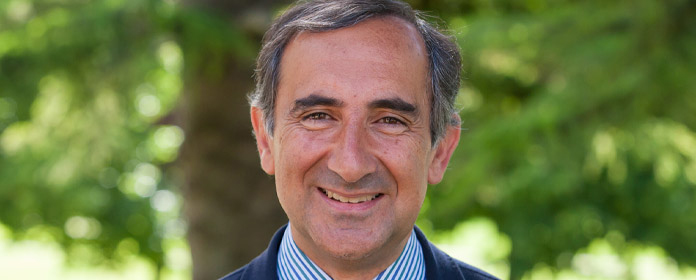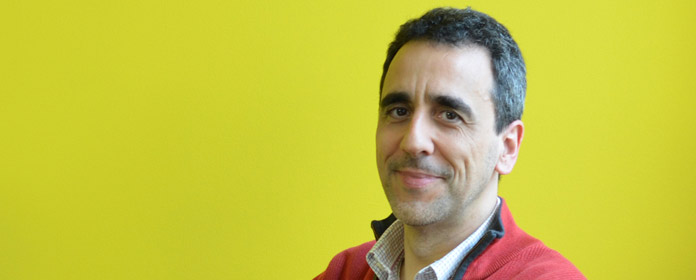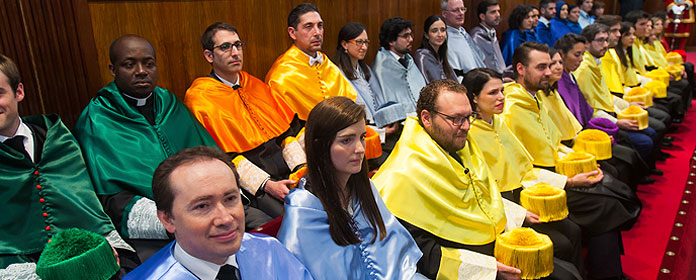Solidarity, civic-mindedness and generosity: the West's keys to recovery in the aftermath of the Covid-19 crisis
Jaume Aurell, researcher of the ICS and Full Professor of Medieval History, reflects on how Western values have helped to overcome the worst situations that this civilization has gone through.

PHOTO: Manuel Castells
Jaume Aurell is Full Professor of Medieval History, co-principal investigator of the project ' 'Religion and Civil Society' of the Institute for Culture and Society (ICS), director of the Degree in Philosophy, Politics and Economics (PPE) of the School of Philosophy and Letters, and director of the Institute business and Humanism of the University of Navarra.
He is the author of the book Genealogy of the West (publishing house Pensódromo), in which he reviews the history of this civilization and its imprint on today's world. In it he reviews some values that are the heritage of the West - particularly Europe - and that can contribute to improving the future of humanity.
In this interview, Professor Aurell reflects on the possible impact of the coronavirus crisis on the future of the West, as well as the extent to which its values have helped to overcome the worst crises that this civilization has suffered throughout its history.
Do you think that the coronavirus will mark a before and after in Western civilization?
I am not in favor of speaking of a before and after in historical events. If we think about the last 70 years, there are six or seven dates that can have the same symbolic importance. For example, the end of World War II in 1945, the fall of the Berlin Wall in 1989, the destruction of the Twin Towers in 2001, to refer to political events. Then, we have had two brutal economic crises, the 1973 and 2008 crises. These are events that have made a great impression on us and have been setting a direction.
It is true that the coronavirus crisis is affecting many people and has more of a social dimension than a political or economic one. Therefore, it will have its importance, but I do not think it will radically change the panorama, but we will have to bring it into line with everything else and see how it evolves.
Moreover, the future is unpredictable. No one would have predicted many of the above events -not even the coronavirus itself- and even less so historians. The future will depend on how we react to this event; it does not depend on something we cannot control, but we can influence the construction of our own future.
So, have the events cited been similar to the coronavirus? Do you think there have been more similar crises throughout history?
To see the ones most similar to what is happening to us now, perhaps we would have to go back to the Age average. From the point of view of the psychological impact that the coronavirus crisis is having, I think that it is quite similar to the plagues of the Age average, especially those of the 14th century, which led to a very noticeable increase in spirituality (but also in the terror of death). Although it did not have the same material consequences and loss of life, both are characterized by a very strong psychological shock. The Western world believed and believed it had everything under control from the medical point of view, because it had achieved well-established medical practices, and the disease meant great confusion and, to a certain extent, disenchantment with the idea of progress, already very battered in our late modernity.
There have also been other great pandemics after the Age average, such as the famous and misnamed 'Spanish Flu' of 1917, which, perhaps, is the closest to us. It has taken a century to have a problem of similar characteristics. Therefore, there have been similar crises but it was a long time ago and, for this reason, it has caught us all so unprepared.
According to writer Laura Spinney, the Spanish flu, although less significant, had a greater impact than World War I. Is she at agreement?
Historians know that the events that most influence people's daily lives, in the end, are not political catastrophes or economic crises, but those other psychological and cultural events. I allow myself the parallelism of invoking here the Revolution of '68, as well as the irruption of the Internet. It was a cultural revolution, which has had a greater influence on people's daily lives than those other warlike conflagrations or such dramatic economic problems that we have suffered in the last 100 years.
What do you think has helped the West recover from these crises in the past? Or does it depend on whether it is a political, economic, cultural crisis?
In that sense, yes, you can give an answer that encompasses the whole West. There is a word core topic, well valued in the West, which is 'solidarity'. The crises have made the West stronger because of its important solidarity movements, for example, the reconstruction after World War II, the German unification after the fall of the Wall in 1989, or even the greater Atlantic integration after the fall of the Twin Towers. It is a pity that these movements of solidarity among nations have not had a continuity beyond solving the dramatic problem that had alerted them. I hope that the current crisis will help us to maintain solidarity over time.
And what are the keys to Europe's recovery?
For it to function as a unit again. Unlike the common response of European countries in the face of the Brexit challenge , which some of us had filled us with hope, we have unfortunately failed at the time of the crisis because each country has gone its own way. Europe's leaders should take the lead again when this dramatic moment is over and relaunch this solidarity. Because, in my view, what has always helped the West to recover in the past, apart from this solidarity, is to combine diversity with commonality. In these moments of major crisis we have to hold on to what we have in common in Europe.
What about rebuilding?
Beyond the medical crisis itself, where doctors and scientists will help us get back on our feet, we need greater political and economic leadership. The lack of leadership can be problematic because the recovery will go through an increase in debt, which is a vicious circle because it increases the imbalance of budgets and it is more difficult to invest in public goods, such as hospitals. Therefore, for this recovery, solidarity and leadership are two conditions core topic.
In your book you focus on the values of the West. Do you think we have values, such as solidarity, that can make us face this crisis in a different way compared to other cultures, for example, those of the East?
In Genealogy of the West I focused on cultural, spiritual and moral values, because in Economics and politics everyone is organized to achieve them, but something much more difficult to achieve, and that responds to a very ancient and unique tradition in Europe are those values, those virtues that are largely from the triple tradition symbolized by Jerusalem, Athens and Rome.
Another important word is 'civility'. I think of Iran and China, but Russia also comes to mind. They are countries that are very used to obey, but that obedience is conditioned to a large extent by fear. The European, in that sense, is a very critical person with himself and with the institutions because there is a very wide scope of freedom. The different way of facing this crisis will come, not so much from submission to a series of laws, but from the conviction that these laws are appropriate. Therefore, we will have to make a global effort and that is what I call civism: laws, sometimes unwritten, that emerge from below, and that we all strive to obey because they benefit us all, even if we do not enjoy their results immediately.
Can you mention a typical example of this civic attitude?
This overwhelming and emotional event that we experience every day at 8 p.m., when all the neighbors start applauding. No one knows who started it or how. But there it is. Obviously, the applause is directed specifically to all the staff health who are playing the subject these days, but we all know -or at least we feel- that it is also an injection of encouragement and self-esteem for all, in these times of such uncertainty and suffering. This gesture of civic-mindedness and solidarity will make us face the crisis, I do not know if in a different way, but ostensibly better.
There is a third leg, in addition to civility and solidarity, which is what Christianity calls charity, which has also adopted the forms of philanthropy, and which we can also generically call generosity. Society is reacting with enormous generosity within its terrible status. At this time, a strict application of certain measures promoted by the authorities is not enough: justice and order will not be enough. It will be necessary a point of charity, of generosity, on the part of all, that will make overcome the limitations. Therefore, these three points: solidarity, civility and generosity.
In the political speech there is a lot of appeal to these values. Do you think they are truly integrated in society, which is accused of being in crisis?
Here I am skeptical. In the political, intellectual and journalistic spheres, we have reached a point where words often belie the facts. I believe that we are capable of assuming these disturbing realities that we are suffering, but first we should make an effort of realism and refund to the word its true function that is to transmit the reality to face the problems with greater realism.
Having said that, it seems to me that there are a great many stockpiles of values in the West. If we look back a little bit, we realize that these values have existed in enormous quantities. There are embers that may not yet be burning now, but they can easily ignite if we can achieve greater solidarity and greater sincerity.
Can we learn new attitudes and values in this crisis?
Where perhaps we need to make an effort is, for example, for the authorities to be more convincing in their arguments and more exemplary in their behavior. It is not very edifying that there are so many cases of COVID-19 among politicians when they are the first ones who could have provided the means. Exemplarity is very important because, as the difficulties increase, those in power must be more convincing in their arguments and conduct.
Next, it would be very important for this crisis to make us review these two great institutions that, since the 16th century, have been dominating our lives: the State in the political sphere and capitalism in the economic sphere. I have always argued for a timely reform of these two great institutions, before more drastic measures have to be taken when there is no other choice. I believe that, once the most acute phase of this crisis has passed, it would be the moment to open a sincere discussion on how to improve both the State apparatus -which has been collapsed by this crisis- and the Economics. We can see another very strong crisis coming, which will have an impact on the 2008 crisis -still not completely overcome in Spain- and for which we will have to find new solutions, those that were not implemented in internship twelve years ago.
Have we now acquired new values, different from those that have characterized the West, which may affect the way we deal with the coronavirus crisis compared to the past?
Yes, we are now more mature, objectively, than other societies because we have learned. Medically, for example, we are behaving impeccably, despite the enormous difficulties. Without that medical preparation, at least in the West, the pandemic would have been much more terrible. One can be constantly looking at the empty part of the glass, but one must also learn to look at the part that is full.
In similar situations in the past, many times in the West there has been social disorder, looting, an increase in crime... And this is not happening now, at least, with the data that I have. We have acquired new values and more experience although, as I said before, we would now need more leadership and more solidarity.
And have we retained any vices or attitudes from the past that may worsen the crisis?
There is a problem that has always been blamed on Western civilization, which is individualism. We have been accumulating this vice in a society more focused on the economic and material, much more liberal in the individual sense. But, at this time of crisis, in Spain it has been shown that solidarity exists, as was already demonstrated with the economic crisis of 2008, because it is known that the family structure helped to cushion the blow to a large extent. For example, there are many donations and initiatives of financial aid and thanks from companies, associations and individuals. This may be a good opportunity to influence the tendency to individualism, although it is difficult to overcome it as it is deeply rooted in the collective mentality.
The second vice that has crept in is the growing mentality of leaving everything in the hands of 'daddy state'. This vice has been taking hold in Western society since the second half of the 20th century, i.e., it is newer. I believe that it is not helping us at all now in this crisis and we should try to redirect it in the future, taking advantage of this experience.
In Genealogy of the West, he argues that the Welfare State achieved by post-war European societies is the greatest acquisition in history. What is its upside and downside?
Providing all people with health care, Education and retirement is something completely unprecedented in world history. However, the downside of this has been that we expect the State to solve everything. In this crisis, as the healthcare system has been overwhelmed, it has been necessary to create a partnership between the private and public sectors, something that is always enriching. I do not understand how there are still people who present these two models as opposing instead of complementary. I do not know if this attitude is more demagogy than malice, or both at the same time, but those who promote it should be more aware of the terrible blow they are dealing to coexistence and the overall wellbeing of society.
There would also be a third field of improvement, from my point of view: consumerism, materialism. If there is one positive thing about confinement, it is that it is helping us to know how to be a little more recollected inwardly, to live a little more in solitude, perhaps to read more, to learn to dialogue more and better with those closest to us. And these are issues that can help the Western world not to depend so much on material things. Sometimes, spending the day with a book can be richer than many other consumer goods that seem essential to us but that, in the end, perhaps are not so essential.




